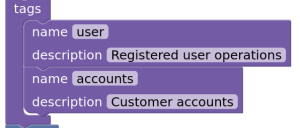Fun fact: I work at Redocly and had used the tool for years, but recently realised that I have a post about a different tool in the archives of my blog, but no Redocly post. So here’s the Lorna-recommended version of OpenAPI linting with Redocly CLI. Continue reading
Tag Archives: openapi
API Description Pipelines
API Linting Levels
Add OpenAI flags to OpenAPI descriptions
x-openai-isConsequential that you can add to your OpenAPI description, to indicate which endpoints should not be called without a human confirmation step.
I’m not doing much with OpenAI right now, but I do plenty with OpenAPI and the question “how do I add this field to my existing API description?” is one that I can answer! What’s more, you can use the advice in this post to add other extensions or additions to your OpenAPI descriptions using Overlays, this advice isn’t OpenAI-specific, but it’s used in the examples. Continue reading
When to version bump your OpenAPI description
Visualise OpenAPI with Blockly
Tips for better documentation with OpenAPI
Improve Existing OpenAPI Descriptions
I also live in the real world, where OpenAPI descriptions get generated from existing codebases, and engineering teams lack either the knowledge or the enthusiasm to modernise their processes. With a generated OpenAPI description, everything else that OpenAPI enables is likely to be disappointing, because the description only contains the information that was in the serverside code, and if you’re lucky some comment metadata. Enter OpenAPI Overlays, a way to describe alterations to an existing OpenAPI description that can be reapplied every time that description changes. Continue reading
What’s New in OpenAPI 3.1
Top features:
– Compatible with JSON Schema 2020-12
– Webhook support
– Many other minor improvements
Continue reading

